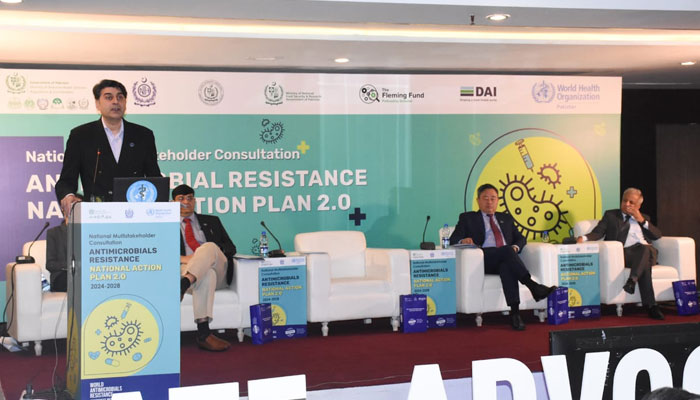Consultations begin to finalise 2nd National Action Plan to tackle AMR in Pakistan
Second phase of plan focuses on comprehensive IPC strategies for both public and private healthcare facilities
ISLAMABAD: The National Institute of Health (NIH) Islamabad on Tuesday launched consultations to finalize the second National Action Plan (NAP) on Antimicrobial Resistance (AMR), aiming to curb a growing health threat with broad social and economic consequences.
The second phase of the plan focuses on comprehensive Infection Prevention and Control (IPC) strategies for both public and private healthcare facilities, where AMR is emerging as a critical health crisis. AMR, which occurs when bacteria, viruses, fungi, and parasites resist standard medical treatments, diminishes the effectiveness of antibiotics and renders common infections harder to treat.
Experts at the two-day consultation, held at a local hotel, emphasized that the unchecked rise of AMR is especially dangerous for low- and middle-income countries like Pakistan, where it not only threatens public health but also poses a significant barrier to achieving Sustainable Development Goals (SDGs). Antimicrobial resistance has had a direct impact on Pakistan’s health system, contributing to increased mortality and straining healthcare resources. According to health experts, AMR could lead to the inability to treat severe infections like pneumonia, tuberculosis, and post-surgical infections, increasing both morbidity and mortality rates. In Pakistan alone, it’s estimated that several thousand lives are lost annually due to infections no longer responding to first-line antibiotics. The World Health Organization has warned that AMR could lead to an annual death toll of 10 million globally by 2050 if current trends continue.
The NIH’s initiative gathered a broad coalition of stakeholders to identify priorities, develop evidence-based strategies, and mobilize resources for an effective AMR response. The revised National Action Plan seeks to enhance surveillance systems, promote responsible antibiotic usage, and strengthen IPC measures. Effective implementation is anticipated to reduce AMR’s burden health and the economy.
Dr. Malik Mukhtar, Coordinator to the Prime Minister for Health, underscored the significance of effective governance in tackling AMR. He stressed that robust inter-sectoral coordination and multi-sectoral collaboration are critical to addressing AMR comprehensively. “The government has taken essential steps, including establishing a National Multi-sectoral AMR Steering Committee to ensure cross-sectoral data sharing and collaboration,” he said, highlighting the need for cohesive policy execution across ministries.
In addition to the steering committee, an AMR Secretariat has been established at NIH to oversee NAP’s execution and foster integration within Pakistan’s health systems. Dr. Muhammad Salman, CEO of NIH, stressed the need to incorporate AMR efforts into the national One Health framework. He also advocated for expanded investment in surveillance to track resistance trends and enable targeted interventions, crucial to preventing the spread of resistant pathogens in both urban and rural settings.
AMR’s implications also have a severe economic impact. The rise of drug-resistant infections means more expensive treatment options and prolonged hospitalizations, which put additional pressure on Pakistan’s healthcare budget. According to the World Bank, by 2050, AMR could push as many as 28 million people into poverty. With the adoption of this revised action plan, Pakistan seeks to reduce AMR-related infections, protect public health, and contribute to global AMR containment efforts, NIH officials said.
-
 Kate Middleton Knew Should Could Not Be ‘voice Of Reason’ With Prince Harry
Kate Middleton Knew Should Could Not Be ‘voice Of Reason’ With Prince Harry -
 Rihanna Has Wardrobe Malfunction At A$AP Rocky Fashion Show
Rihanna Has Wardrobe Malfunction At A$AP Rocky Fashion Show -
 Prince Harry Felt System Had ‘one Rule For Him, One For Prince William’
Prince Harry Felt System Had ‘one Rule For Him, One For Prince William’ -
 Jake Paul's Fiancée Sends Him Over The Moon Over Stunning Victory
Jake Paul's Fiancée Sends Him Over The Moon Over Stunning Victory -
 Why Prince William, Kate Middleton 'partnership' Is Important For Monarchy
Why Prince William, Kate Middleton 'partnership' Is Important For Monarchy -
 Katie Price Drama Escalates As Family Stays In Touch With Ex JJ Slater
Katie Price Drama Escalates As Family Stays In Touch With Ex JJ Slater -
 Critics Target Palace Narrative After Andrew's Controversy Refuses To Die
Critics Target Palace Narrative After Andrew's Controversy Refuses To Die -
 Sarah Ferguson’s Delusions Take A Turn For The Worse: ‘She’s Been Deserted’
Sarah Ferguson’s Delusions Take A Turn For The Worse: ‘She’s Been Deserted’ -
 ICE Agents 'fake Car Trouble' To Arrest Minnesota Man, Family Says
ICE Agents 'fake Car Trouble' To Arrest Minnesota Man, Family Says -
 Camila Mendes Reveals How She Prepared For Her Role In 'Idiotka'
Camila Mendes Reveals How She Prepared For Her Role In 'Idiotka' -
 China Confirms Visa-free Travel For UK, Canada Nationals
China Confirms Visa-free Travel For UK, Canada Nationals -
 Inside Sarah Ferguson, Andrew Windsor's Emotional Collapse After Epstein Fallout
Inside Sarah Ferguson, Andrew Windsor's Emotional Collapse After Epstein Fallout -
 Bad Bunny's Star Power Explodes Tourism Searches For His Hometown
Bad Bunny's Star Power Explodes Tourism Searches For His Hometown -
 Jennifer Aniston Gives Peek Into Love Life With Cryptic Snap Of Jim Curtis
Jennifer Aniston Gives Peek Into Love Life With Cryptic Snap Of Jim Curtis -
 Prince Harry Turns Diana Into Content: ‘It Would Have Appalled Her To Be Repackaged For Profit’
Prince Harry Turns Diana Into Content: ‘It Would Have Appalled Her To Be Repackaged For Profit’ -
 Prince William's Love For His Three Children Revealed During Family Crisis
Prince William's Love For His Three Children Revealed During Family Crisis




